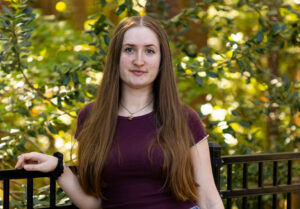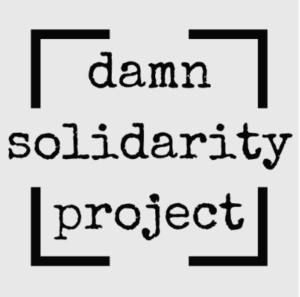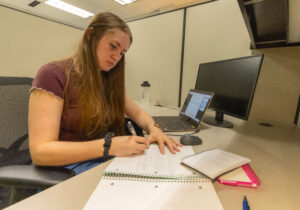
Jordan Birkner, RBT
I have struggled with socializing and focus as long as I can remember. Trying to blend in with normative expectations has always felt exhausting to me.
I knew I struggled with mental health during middle and high school, but traditional therapy and psychiatry didn’t help significantly. It wasn’t until college that I had the opportunity to explore my own unique experiences in a different context. It’s not that my family didn’t do their best to be supportive, but a lot of the challenges I faced were difficult to recognize at home.
My freshman year, my roommate told me they suspected I had ADHD. Common symptoms like difficulty focusing and bursts of energy did fit my behaviors, so I began to research strategies those with ADHD use to face these challenges. I discovered the positive impacts organization can have for ADHD symptoms and put additional effort into controlling my space to see if it would benefit my work and focus.
My efforts to change my behaviors before receiving a diagnosis improved my stress and productivity. A few months later, I mentioned the possibility of ADHD to my psychiatrist and, as it turns out, my roommate’s guess was spot on.
Later that year, another friend said I might be autistic. This condition seemed less likely to have gone unnoticed until adulthood but was not impossible. Women are significantly underdiagnosed at a rate of nearly four to one.
Knowing that a diagnostic label would not change who I was, I applied to a waiting list for an autism spectrum disorder evaluation. If I truly did have autism, receiving a formal diagnosis would enable me access to additional resources and accommodations that I hadn’t realized were relevant.
“I didn’t need to mask in conversation and pretend I understood social contexts when I didn’t.”
The waiting list for an evaluation often takes a long time, sometimes even two to four years. However, I decided to use this waiting period to explore more about what autism spectrum disorder was and learn strategies that individuals can use to help manage some of its challenges.
 I was accepted to the Critical DAMN Studies Lab my sophomore year, where data access and solidarity for the autistic community is a core aspect of the project. The more I researched, the more I recognized methods that could be beneficial to me, regardless of the outcome of my evaluation.
I was accepted to the Critical DAMN Studies Lab my sophomore year, where data access and solidarity for the autistic community is a core aspect of the project. The more I researched, the more I recognized methods that could be beneficial to me, regardless of the outcome of my evaluation.
Even with the help of ADHD medication, I struggled with engaging in work I was not passionate about. This encouraged me to apply for NC State’s Self-Design program, enabling me to select interdisciplinary classes to form a degree relevant to my interests and goals instead of following a pre-set course track.
I was also finally able to admit to myself that I am an introvert. My efforts to engage with others in the past had usually left me drained, and to try and overcompensate for these difficulties, I had just tried harder. But I learned to advocate to my friends and family how I needed time to myself to recharge and set clear boundaries without feeling like a buzzkill. I no longer forced myself to endure hours of socializing that left me exhausted.
Additionally, I looked into other potential challenges of autism, such as difficulty relating to others. I became actively aware of the impact of my own words and actions; making additional efforts to ask for and provide clarity in conversation can help avoid any implied confusion. I didn’t need to mask in conversation and pretend I understood social contexts when I didn’t.
Examining these and other aspects of my experiences opened my eyes to strategies that would assist me with obstacles I faced every day. I didn’t self-diagnose and claim to be autistic before my evaluation, but understanding autism spectrum disorder better helped improve my relationships with everyone in my life. Regardless of labels, I finally found tools that helped where traditional therapy and medications hadn’t.

After months of waiting, I finally received an autism spectrum disorder diagnosis as a junior in college — validating the struggles I’ve had throughout my life. I also was able to file accommodations with the Disability Resource Office and receive relevant academic support.
However, this new label didn’t change much else. Diagnostic evaluations are a long process that are not easy to access. I didn’t wait for an ADHD or autism diagnosis to start utilizing strategies, support and self-advocacy. I also didn’t need to self-diagnose to explain to those close to me that patience, space and my interests were aspects of my life I had neglected previously.
I am grateful that people in my life were able to open these conversations to me about my mental health in a new light. I was able to reflect and discover what I could try in order to improve aspects of my life I had never considered as vital before.
If anyone is struggling with mental health without a diagnosis, I encourage them to try similar techniques. See what resources are available to provide support for certain difficulties, regardless of ties to labels and psychiatry. If you are struggling, it may not be obvious from the inside what aspects in your routines contribute to challenges you face. Regardless of your identities, being willing to try things differently and you may impact your life for the better.
This article first appeared on the Technician website at Mental Health Journeys: Positive change doesn’t rely on a diagnosis | Opinion | technicianonline.com.
For more articles likes this, visit the Autism Society of North Carolina Blog.
Go back
